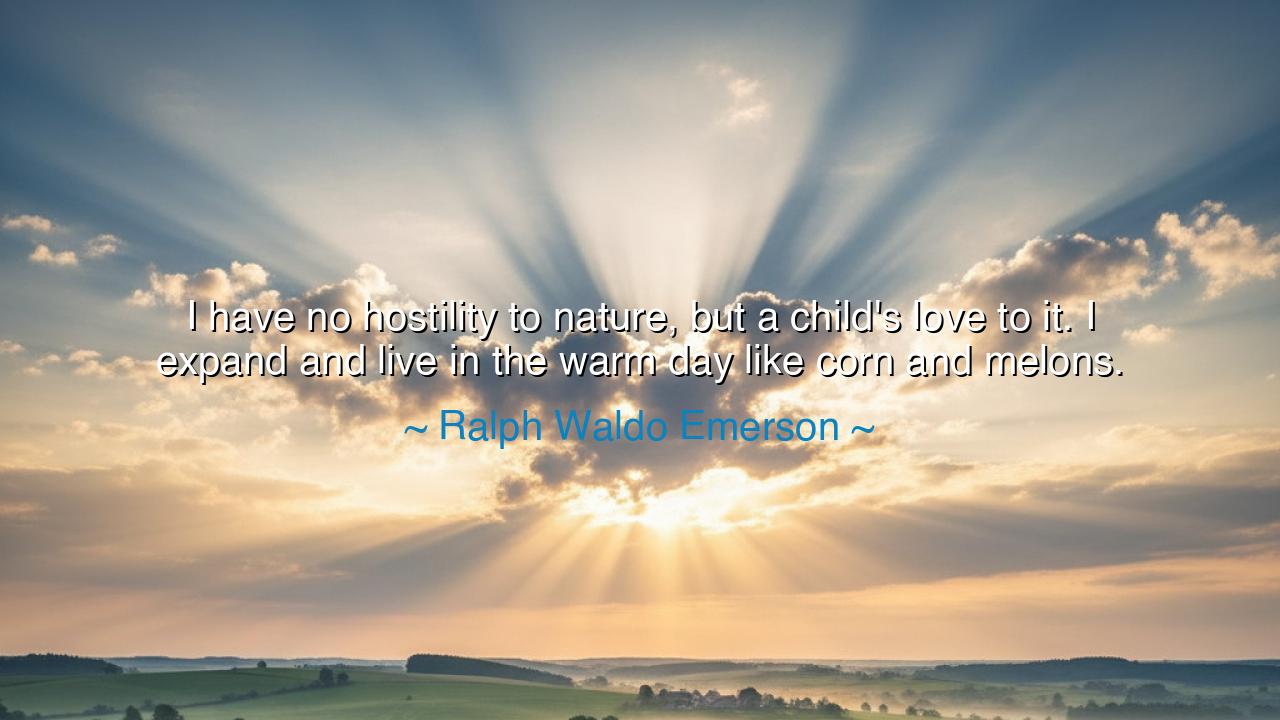
I have no hostility to nature, but a child's love to it. I
I have no hostility to nature, but a child's love to it. I expand and live in the warm day like corn and melons.






Ralph Waldo Emerson once declared: “I have no hostility to nature, but a child’s love to it. I expand and live in the warm day like corn and melons.” In this utterance is contained not only his Transcendentalist spirit but the voice of all humanity reaching back to its first breath under the open sky. Emerson does not stand as a conqueror of the earth, nor as one estranged from its order. He stands as a child before a mother, reverent, innocent, full of trust. He speaks of love, not of dominion, and in doing so reveals that the truest bond with the natural world is one of kinship and joy.
The origin of this thought lies in the philosophy of Transcendentalism, a movement Emerson himself helped shape. It was a call to return to the inward life, to nature, to the divine presence that flows through all things. In his age, men already clamored to expand cities, to dominate industry, to treat the world as mere resource. Yet Emerson raised his voice to remind them: man is not separate from the fields and rivers. He is not lord over them but brother among them. To love nature with a child’s affection is to dwell not in fear or conquest, but in a state of wonder that enlarges the soul.
Let us think of an example from history. When Marcus Aurelius, emperor of Rome, found respite from wars and burdens, he often retreated into the fields, writing in his Meditations of the stars above and the harmony of the universe. Though ruler of men, he sought renewal not in marble palaces but in the silence of dawn, where the dew clings to the grass. The greatest ruler of the earth looked upward and outward, knowing that his spirit expanded in the presence of nature’s quiet power. Emerson’s words echo this truth: to expand like corn and melons beneath the sun is to live in harmony with the eternal rhythms of the world.
The imagery of corn and melons is not idle poetry. Corn stretches upward, drinking the warmth of the sun, while melons swell sweet and full beneath it. Neither resists the day, neither resents the rain. They accept, they grow, they flourish. Emerson likens himself to them because he too would live in acceptance, finding vitality in the natural warmth of life. To stand thus, with arms open to the world, is to live in simplicity, free of bitterness and estrangement.
In these words, we hear a challenge to our own age, where many live estranged from the earth, breathing in steel and smoke rather than fresh wind. To return to a child’s love of nature is not a matter of sentiment, but of survival for the spirit. A child does not calculate the worth of the sunbeam; he delights in it. A child does not demand profit from a flower; he marvels at its colors. So must we return, lest our hearts harden and our joy wither.
The practical lesson is this: go often into the open air. Let the sun strike your face, and do not shield yourself from it with endless haste. Sit beneath a tree and listen to the wind as though it were the voice of an elder. Walk barefoot upon the earth and remember that you, too, are a living being among countless others. In this way you will learn, as Emerson teaches, that the world is not an enemy to be subdued, but a companion to be cherished.
Therefore, dear soul, do not bear hostility to nature; cast off the armor of suspicion and fear. Embrace it as a child embraces the day, with wonder and laughter. For to live in harmony with the warm light is to expand inwardly, to grow in peace, and to taste the sweetness of existence. Carry this teaching into your life: sow gratitude like seed, reap joy like harvest, and live as one who belongs eternally to the great household of the earth.
In this, Emerson’s voice becomes our inheritance: a reminder that the path to freedom, to strength, to joy, begins not in conquest but in love for the world that sustains us.






AAdministratorAdministrator
Welcome, honored guests. Please leave a comment, we will respond soon